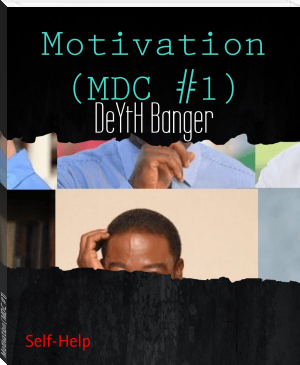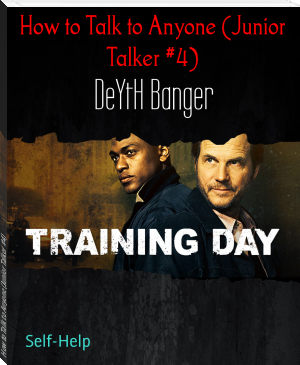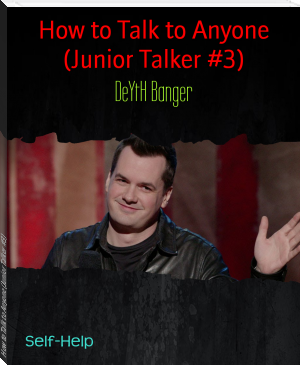Motivation (MDC #1) by DeYtH Banger (free novels TXT) 📕

- Author: DeYtH Banger
Book online «Motivation (MDC #1) by DeYtH Banger (free novels TXT) 📕». Author DeYtH Banger
you. Think of something that will take you mind completely off what you're
doing physically.
3. Stop talking to yourself. If you're constantly doing this in your head,
stop. Shy people often talk to themselves to avoid talking to other people.
Switch your focus using the technique I just showed you. When you quiet your
mind and put your focus on the situation in front of you, you will find yourself
becoming much more likely to say something.
4. Donʼt think before you act. Donʼt wonder in advance of what you are
“going to say.” The worst thing is when you rehearse what you are going to
say in your head before you say it. Very social people just get a general gutfeeling
of wanting to say something, and they open their mouths and say it.
Donʼt plan - act first, then correct your actions as you go along.
5. Don't hesitate. When a thought pops into your head, express it within 2
seconds. The longer you wait the worse your fear of expressing it badly
becomes. You build it up too much in your mind. The solution is to downplay.
You could be in a war zone right now. Instead, you're just talking to someone.
Being spontaneous is a muscle, the more you use it the easier it becomes to
rely on it.
6. Donʼt criticize your actions. After you do something, do not analyze
how well it went. Hereʼs how a typical inhibited person acts: after he has
gotten up enough courage to say something, he immediately says to himself,
“Maybe I shouldnʼt have said that. Maybe the other person will take it the
wrong way.” Stop being so self-critical. Your criticism is unnecessary because
when you make a mistake in a social situation, your mind learns the lesson
and automatically adjusts your future behaviour.
Itʼs the same as learning to ride a bicycle. If you fall, your brain gets
feedback from the experience. Over time, you learn how to keep your balance
and not make the same mistakes again. Learning social skills works the same
way. You may start out awkward and weird, but your brain continually learns
from your experiences and improves your behaviour automatically based on
the feedback you get from interacting with other people. So stop tearing
yourself apart. Useful and beneficial feedback works subconsciously,
spontaneously, and automatically. Constantly second-guessing yourself on a
daily basis is defeating."
Note: Overthinking... Less exposure to outside world….less standards in life… seeing life in negative way.
THAT'S WHAT RUINS US
IT'S JUST TIME TO SAY:
"I am okay…"
NO MORE
NO MORE
NO MORE
EXCUSES
ACTION
ACTION
ACTION
ACTION
EXCUSES
Are the things who stops us getting healthy relationship, getting and expressing us… making more friends. Being confident… getting proper frame and even it starts with 1-2 ends with 1000 and you feel guilty.
"Not Enough
Gonna Get Arrested
Not Now
Tomorrow
Later
After
Okay… I promise… tomorrow
Let's focus on something else
She is too hot
She is ugly
She is not my type
I am not in the state
She seems too busy
I got enough done for today
After few minutes
When I start preparing getting ready
People are going to hate me
She is not going to like me
She is going to get mad
She is going to get angry
She seems like she is having a serious discussion
Not Now.. . Tomorrow with somebody else
Not alone… not now
Not Now.. . I am with him
She is black
She is playing on her phone
She is talking to a friend
She is talking on the phone
She is looking down
She is going to feel not uncomfortable
When I get off
When time gets
Let's re-think it
Now I am gonna chill out… tomorrow
Fuck it…Tomorrow"
"Self-Monitoring Causes Self-Consciousness and Inhibition
Letʼs think about what self-monitoring actually is. This will help you figure out
a way to stop it. Self-monitoring when you're trying to consciously control actions
and behaviours that are normally unconscious. What does that mean?
Most of the time your breathing is an unconscious behaviour. You are not
conscious of it because your body takes care of it without you having to do
anything about it. But if you started to make yourself breathe differently, you have
now made breathing into a conscious behaviour. Now you have your focus on it.
Itʼs like the difference between letting an airplane run on autopilot versus taking
control of it using the steering wheel.
So the point is, you self-monitor when try to take control of behaviours that
should happen on their own because you are afraid of the impression youʼre
making.
Do you control how you move your mouth when you talk? Do you
consciously control how you're breathing? Do you think about how your arms and
legs move as you walk or sit down? Do you worry about what position your arms
are in? Maybe you aren't doing it now, but in tough social situations you do it.
I often get people who ask me things like “How can I walk/speak more
naturally?” The problem is, they are usually looking for some tip they can use to
force their walk to be more natural. What they donʼt realize is that the fact they
94
are even thinking about this is whatʼs causing the problem to begin with!"
"1. You Hesitate
Instead of just letting go and expressing yourself, you think and think and
think. And when you finally do something, it feels unnatural. It's not fun for you
and it's not fun for other people. The more you hesitate before doing something,
the more contrived and phony it will seem when you finally do.
For example, if you think of something to say, and them wonder if you
should say it, you get nervous. It stops becoming something that just popped into
your head and becomes YOUR own idea. You put more and more importance on
how people will react to it the longer you wait. When you finally do say it, you're
nervous. You spend too much time and attention controlling how your act, and it
comes out unnatural.
2. You Seem Out Of Focus
When you Self-Monitor, you seem out of focus. Like you're actually 10
seconds in the past or 10 seconds in the future, instead of being in the NOW and
enjoying it.
Only shy people and those who are extremely self-conscious monitor what
they do. Normal people don't. What normal people do, is not think at all before
they act. They don't think about what they're going to say next. They get a
general feeling of what they want to communicate, and they say it.
92
Often when I tell this to people with SA, they feel confused. If they donʼt
know what they are going to do before they do it, then couldnʼt they start spewing
nonsense and repelling everyone? And is it really a good idea to become one of
those loud, obnoxious people who say everything without thinking first?
Once you learn how to stop self-monitoring, I guarantee youʼll change your
mind. Youʼll find that letting go of needing to tightly control everything you
communicate will actually make you communicate better. It will be like youʼve
been driving your whole life with brakes on socially, and just now you discovered
how to release your brakes.
Think back to one of your best experiences socially. Chances are, it felt like
the right words were somehow coming out of your mouth automatically. You
weren't stuck in your head, trying to come up with something to say. It was all
flowing, and you felt in the moment and connected to the other person. Best of
all, you were having fun.
3. You Seem Inauthentic
Oh, the irony. You want people to like you and think you're a swell guy or
girl, but they don't. They think you're inauthentic.
When you think about everything you say and do, it doesn't come from you
directly. It's been filtered by your brain, and people can feel it. They can sense
the slight off-ness when you've been thinking of a remark for a minute. They don't
feel the same energy coming from you as from a person who comes up with
something to say on the spot, and that lack of energy turns them off.
Basically, any time you are trying to create some sort of impression on
people, you are sabotaging yourself. Only someone needy and desperate for
93
approval would be trying so hard to make others perceive him well. On the other
hand, if you donʼt really care about the particular impression you make on
someone, it shows that you are secure in yourself because you donʼt require
other people to approve of you."
"“I expect nothing and accept everything.”"
"Our mind has all kinds of automatic thought processes that we don’t even know are going on. Expectations are just one of them, albeit an important one.
Here’s the harsh truth about how our brain works.
We all like to believe in something called “free will”. It’s one of those concepts that really speaks to who we are as human beings. I mean, let’s be honest, if we don’t have free will, what in the hell do we have?
We value the notion that we freely choose what we do, and when to do it. We want to feel that we control our own fate and shape our own destiny.
But when our minds are ruled by these automatic thought processes, do we really have free will? Many would argue that we don’t. Listen, here’s how much free will you have – stop doing all that shit you know you shouldn’t be doing and start doing all the shit you know you should be doing. All of it.
This free will stuff isn’t so easy now is it!?
Because, as we’ve talked about throughout this book, even when you feel yourself making a conscious decision, there are a series of unconscious thought processes that are driving that choice. Things you don’t even see or acknowledge.
People are much more irrational and illogical than we realize. In many cases, our subconscious is the puppet master that truly pulls the strings.
Fortunately, you can take back your freedom to choose. And that’s by understanding how your mind works, seeing what it’s doing as it does it, and being able to use that information to cognitively choose something else. To make conscious that which is currently unconscious.
Expectations are just one of these things."
"I’m not talking about the usual kind





Comments (0)